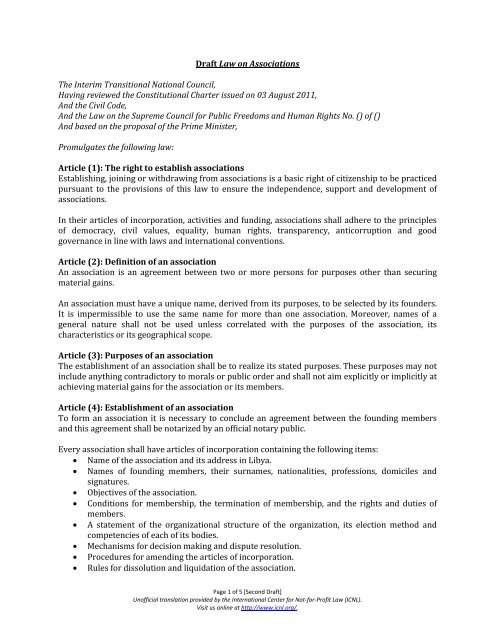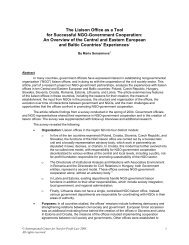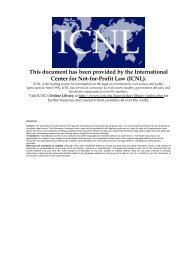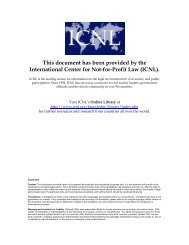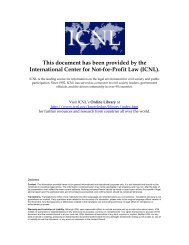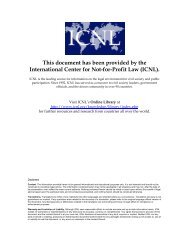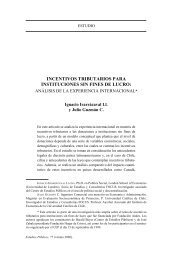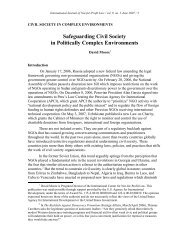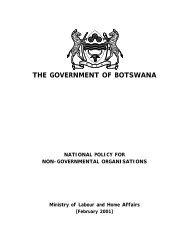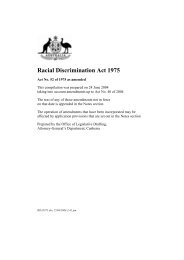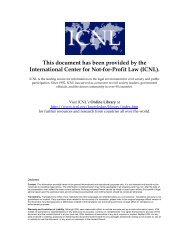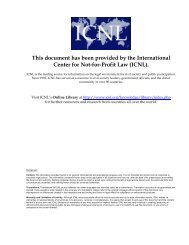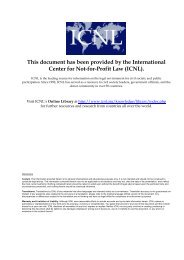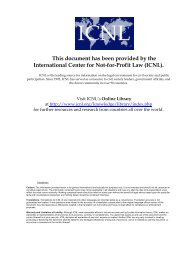English - The International Center for Not-for-Profit Law
English - The International Center for Not-for-Profit Law
English - The International Center for Not-for-Profit Law
You also want an ePaper? Increase the reach of your titles
YUMPU automatically turns print PDFs into web optimized ePapers that Google loves.
Draft <strong>Law</strong> on Associations<br />
<strong>The</strong> Interim Transitional National Council,<br />
Having reviewed the Constitutional Charter issued on 03 August 2011,<br />
And the Civil Code,<br />
And the <strong>Law</strong> on the Supreme Council <strong>for</strong> Public Freedoms and Human Rights No. () of ()<br />
And based on the proposal of the Prime Minister,<br />
Promulgates the following law:<br />
Article (1): <strong>The</strong> right to establish associations<br />
Establishing, joining or withdrawing from associations is a basic right of citizenship to be practiced<br />
pursuant to the provisions of this law to ensure the independence, support and development of<br />
associations.<br />
In their articles of incorporation, activities and funding, associations shall adhere to the principles<br />
of democracy, civil values, equality, human rights, transparency, anticorruption and good<br />
governance in line with laws and international conventions.<br />
Article (2): Definition of an association<br />
An association is an agreement between two or more persons <strong>for</strong> purposes other than securing<br />
material gains.<br />
An association must have a unique name, derived from its purposes, to be selected by its founders.<br />
It is impermissible to use the same name <strong>for</strong> more than one association. Moreover, names of a<br />
general nature shall not be used unless correlated with the purposes of the association, its<br />
characteristics or its geographical scope.<br />
Article (3): Purposes of an association<br />
<strong>The</strong> establishment of an association shall be to realize its stated purposes. <strong>The</strong>se purposes may not<br />
include anything contradictory to morals or public order and shall not aim explicitly or implicitly at<br />
achieving material gains <strong>for</strong> the association or its members.<br />
Article (4): Establishment of an association<br />
To <strong>for</strong>m an association it is necessary to conclude an agreement between the founding members<br />
and this agreement shall be notarized by an official notary public.<br />
Every association shall have articles of incorporation containing the following items:<br />
• Name of the association and its address in Libya.<br />
• Names of founding members, their surnames, nationalities, professions, domiciles and<br />
signatures.<br />
• Objectives of the association.<br />
• Conditions <strong>for</strong> membership, the termination of membership, and the rights and duties of<br />
members.<br />
• A statement of the organizational structure of the organization, its election method and<br />
competencies of each of its bodies.<br />
• Mechanisms <strong>for</strong> decision making and dispute resolution.<br />
• Procedures <strong>for</strong> amending the articles of incorporation.<br />
• Rules <strong>for</strong> dissolution and liquidation of the association.<br />
Page 1 of 5 [Second Draft]<br />
Unofficial translation provided by the <strong>International</strong> <strong>Center</strong> <strong>for</strong> <strong>Not</strong>-<strong>for</strong>-<strong>Profit</strong> <strong>Law</strong> (ICNL).<br />
Visit us online at http://www.icnl.org/.
Article (5): Prohibitions on associations<br />
An association is prohibited from:<br />
• Calling <strong>for</strong> violence, hatred, bigotry or discrimination on the bases of religion, sex, language,<br />
race, or tribal or regional affiliation.<br />
• Per<strong>for</strong>ming commercial activities <strong>for</strong> the purpose of distributing funds and profits to their<br />
members or utilizing the association <strong>for</strong> tax evasion purposes.<br />
Article (6): Legal personality of an association and procedures <strong>for</strong> its declaration<br />
An association acquires legal personality immediately upon its declaration.<br />
<strong>The</strong> declaration request shall be presented to the nearest branch of the Supreme Council <strong>for</strong> Public<br />
Freedoms and Human Rights and a receipt shall be provided; or the request may be sent by<br />
registered mail with receipt acknowledgment.<br />
<strong>The</strong> Council, within two weeks of receiving the application, shall register and declare the<br />
association or notify the association at the address contained in the application of its rejection of<br />
the declaration request along with the reasons <strong>for</strong> such rejection including the missing items or<br />
required amendments to the memorandum of incorporation or articles of incorporation pursuant<br />
to the law. <strong>The</strong> applicant may either complete or correct the missing items and resubmit the<br />
documents in question or submit a petition confirming that he does not accept making any<br />
amendments and that he insists on submitting his application as is. In this case, the Council may<br />
either declare the association immediately as presented or submit, within one week, a petition<br />
requesting affirmation of the rejection to a penal court judge at the court where the association is<br />
located to decide in the validity of the rejection. <strong>The</strong> judge shall issue his decision regarding the<br />
petition by affirming or rejecting it within 10 days of submission, otherwise the petition is<br />
considered null and void. In this case, the association is declared immediately and the Council, if it<br />
wishes to abolish the declaration of the association, shall have recourse to the judiciary to issue a<br />
ruling in this respect.<br />
In all cases, if the Council fails to meet any of the deadlines provided <strong>for</strong> in this Article, the<br />
association is considered registered and declared by law. Upon declaration, the Council shall grant<br />
the association a true copy of the declaration document.<br />
Article (7): Rights of associations<br />
An association has the following rights:<br />
• <strong>The</strong> right to access in<strong>for</strong>mation related to the association activities.<br />
• <strong>The</strong> right to evaluate the per<strong>for</strong>mance of state entities and submit proposals <strong>for</strong> improving<br />
per<strong>for</strong>mance.<br />
• <strong>The</strong> right of assembly, free meeting, organizing marches, conferences, workshops and all<br />
other civil activities.<br />
• <strong>The</strong> right to publish reports and in<strong>for</strong>mation, print newsletters and conduct opinion polls.<br />
Public entities shall not directly or indirectly hinder or impede the activities of an association<br />
except by a judicial order. Competent public entities shall take all necessary actions to provide<br />
protection <strong>for</strong> an association, its members, or any person against any violence, threat, pressure or<br />
arbitrary acts as a result of practicing rights stated in this law by the association.<br />
Page 2 of 5 [Second Draft]<br />
Unofficial translation provided by the <strong>International</strong> <strong>Center</strong> <strong>for</strong> <strong>Not</strong>-<strong>for</strong>-<strong>Profit</strong> <strong>Law</strong> (ICNL).<br />
Visit us online at http://www.icnl.org/.
Article (8): Association bodies<br />
<strong>The</strong> supreme authority in the association is its members through their ordinary or extraordinary<br />
General Assembly. <strong>The</strong> articles of incorporation shall detail the competencies of both types of<br />
Assemblies and the methods <strong>for</strong> invitation, convocation and decision making.<br />
<strong>The</strong> association shall have a Board of Directors and the articles of incorporation shall state the<br />
method <strong>for</strong> <strong>for</strong>mation of the Board of Directors, its competencies, decision making and delegation of<br />
powers.<br />
<strong>The</strong> chairman, or the vice-chairman in case of the <strong>for</strong>mer’s absence, shall be the legal representative<br />
of the association be<strong>for</strong>e courts and in its relations with third parties.<br />
Article (9): Conflict of Interest Principle<br />
It is impermissible <strong>for</strong> members of the association or its staff to participate in or attempt to<br />
influence decisions that may lead to conflict between the interests of the association and [1] their<br />
personal interests, [2] their professional interests, or [3] the interests of their relatives up the<br />
fourth degree.<br />
Article (10): Resources, revenues and budget of the association<br />
<strong>The</strong> principal rule is that the association is self-funded from the subscriptions of its members. <strong>The</strong><br />
association may accept grants, donations or bequests that are unconditional except if such<br />
conditions are related to its proper functioning or the achievement of its goals. <strong>The</strong> association may<br />
also have revenues from its properties, projects or activities.<br />
<strong>The</strong> state shall allocate necessary funds in its budgets to support and assist associations on the<br />
bases of efficiency and feasibility of projects and activities. <strong>The</strong> executive regulation of this law shall<br />
define controls and mechanisms of public funding. Associations receiving public funds shall submit<br />
annual financial reports to the Audit Bureau showing their sources of funds and the disbursement<br />
of public funds allocated to the association.<br />
Article (11): Accounting books to be kept<br />
<strong>The</strong> association shall keep books required by the law in accordance with the accounting principles<br />
as stated in the executive regulation of this law.<br />
Any association accepting grants, donations or bequests or having revenues from its properties or<br />
projects shall appoint an external auditor to audit its accounts. In addition to above, the association<br />
shall keep a special register <strong>for</strong> grants, donations and bequests and a special register <strong>for</strong> revenues<br />
from its properties, activities or projects.<br />
In all cases, the association must utilize its resources <strong>for</strong> activities achieving its objectives and shall<br />
in no case invest its funds <strong>for</strong> any commercial purposes.<br />
Article (12): Declaration of financial resources<br />
<strong>The</strong> association must declare the acceptance and identify the source of any donations, grants or<br />
bequests from <strong>for</strong>eign entities in a daily newspaper and on its website within one month of the date<br />
of accepting the donation, grant or bequest.<br />
<strong>The</strong> association must also publish the annual reports of its activities and finances on its website.<br />
Page 3 of 5 [Second Draft]<br />
Unofficial translation provided by the <strong>International</strong> <strong>Center</strong> <strong>for</strong> <strong>Not</strong>-<strong>for</strong>-<strong>Profit</strong> <strong>Law</strong> (ICNL).<br />
Visit us online at http://www.icnl.org/.
<strong>The</strong> association must send official copies of the abovementioned documents to the Supreme Council<br />
<strong>for</strong> Public Freedoms and Human Rights within two weeks as of the date of accepting domestic or<br />
<strong>for</strong>eign grants, donations or bequests or from the date of preparing the report as the case may be.<br />
Article (13): Prohibited Transactions with Foreign Entities<br />
It is impermissible <strong>for</strong> an association to deal with countries with which Libya has no diplomatic<br />
relations. An association is also prohibited from accepting donations, grants or bequests from<br />
organizations adopting the policies of these countries or defending their interests.<br />
Article (14): Maintenance of Association Documents and Registers<br />
An association shall maintain its financial documents and registers <strong>for</strong> a period of ten years.<br />
Article (15): Branches of <strong>for</strong>eign associations<br />
Foreign associations may open branches in Libya.<br />
It is a requirement that those managing the branch must be of Libyan citizenship without prejudice<br />
to the right of the association to send [<strong>for</strong>eign] experts and specialists to assist in its functions.<br />
A resolution from the Council of Ministers shall define the competent entity <strong>for</strong> granting a permit to<br />
establish the branch and define the required declaration documents, duration of the permit, type of<br />
activity [which may be undertaken] and fees <strong>for</strong> the permit.<br />
Article (16): Litigation powers <strong>for</strong> associations<br />
Associations have the interest and capacity to appeal be<strong>for</strong>e the judiciary against any law or<br />
resolution directly or indirectly related to their objectives <strong>for</strong> the public interest. <strong>The</strong> provisions<br />
related to the conditions of “capacity” and “interest” in appeals in this context shall be broadly<br />
interpreted.<br />
Article (17): Merger, dissolution and liquidation<br />
Associations of similar objectives may merge to establish one association based on [the processes<br />
defined in] their articles of incorporation. Associations are dissolved by the will of their members as<br />
expressed by a resolution of the General Assembly or by a ruling from a competent judge at the<br />
competent court where the association is located based on a request from the Council. In case the<br />
association is dissolved, its assets shall be liquidated following accepted accounting standards. <strong>The</strong><br />
association’s funds, following payment of all of its obligations, shall inure to an association with<br />
similar objectives or any other association as determined by the General Assembly, the liquidator,<br />
or the court.<br />
[<strong>Not</strong>e from Translator: Arabic version is missing Article 18. It is not clear if this version is<br />
improperly numbered or if an Article was accidentally omitted].<br />
Article (19): Association networks and coalitions<br />
Two or more associations may establish a network to cooperate in realizing their shared objectives<br />
and to mobilize their capacities <strong>for</strong> lobbying. <strong>The</strong> <strong>for</strong>mation of a network shall be based on a<br />
written agreement binding on its parties. <strong>The</strong> network shall be given a unique name and may<br />
choose whether or not to register as a legal entity. In the event that that network is not declared, it<br />
does not acquire legal personality. Associations of similar objectives may also establish coalitions to<br />
implement major activities that exceed the ability of a single association or network.<br />
Page 4 of 5 [Second Draft]<br />
Unofficial translation provided by the <strong>International</strong> <strong>Center</strong> <strong>for</strong> <strong>Not</strong>-<strong>for</strong>-<strong>Profit</strong> <strong>Law</strong> (ICNL).<br />
Visit us online at http://www.icnl.org/.
Article (20): Executive regulation<br />
<strong>The</strong> Supreme Council <strong>for</strong> Public Freedoms and Human Rights shall issue an executive regulation <strong>for</strong><br />
this law as well as examples of declaration applications, petitions and a registration insistence <strong>for</strong>m<br />
as set <strong>for</strong>th herein. It shall also issue model articles of incorporation to assist founders in<br />
developing their articles of incorporation. <strong>The</strong> executive regulation shall cover all detailed<br />
conditions <strong>for</strong> issuing a permit <strong>for</strong> a <strong>for</strong>eign association to open a branch in Libya. <strong>The</strong> non-issuance<br />
of this regulation shall not jeopardize the right of individuals to establish and declare their<br />
associations pursuant to this law.<br />
Article (21): Transitional provisions<br />
Associations existing at the time of issuance of this law shall adjust their status to comply with the<br />
provisions of this law within no more than one year of the date of its issuance. <strong>The</strong>se associations<br />
shall notify the Supreme Council <strong>for</strong> Public Freedoms and Human Rights of the actions they have<br />
taken in this regard. <strong>The</strong> provisions of Article 7 herein shall be applicable to any objection from the<br />
declaration entity.<br />
Article (22): Penal actions<br />
In the event that an association violates a provision of this law, the Supreme Council <strong>for</strong> Public<br />
Freedoms and Human Rights may take the following actions in sequence:<br />
1. <strong>Not</strong>ify or in<strong>for</strong>m the association and require it to resolve the violation within two weeks<br />
from the date of notification, clearly identifying the violation of the law in the notification.<br />
2. Warn the association if it does not respond to the notification.<br />
3. Suspend the activities of the association <strong>for</strong> a defined period. <strong>The</strong> suspension shall be issued<br />
by a competent judge upon the submission of a petition from the Council following the<br />
expiration of the two week notification period.<br />
4. Dissolve the association based on a ruling of a competent court following the submission of<br />
a petition from the Council in the event that the association fails to remedy or repeats the<br />
violation.<br />
In the event that an association violates Articles 5, 12, or 13 of this law, the Council need not adhere<br />
to the sequence provided from in this Article and may immediately request suspension or<br />
dissolution of the association.<br />
Article (23): Effectiveness<br />
This law is effective as of the date of issue and shall be published in the Official Gazette. This law<br />
repeals <strong>Law</strong> Number 19 of the Year 2001 on the Reorganization of Local Associations. It also<br />
repeals any other law contradictory to its provisions.<br />
Issued in () on ()<br />
Page 5 of 5 [Second Draft]<br />
Unofficial translation provided by the <strong>International</strong> <strong>Center</strong> <strong>for</strong> <strong>Not</strong>-<strong>for</strong>-<strong>Profit</strong> <strong>Law</strong> (ICNL).<br />
Visit us online at http://www.icnl.org/.


